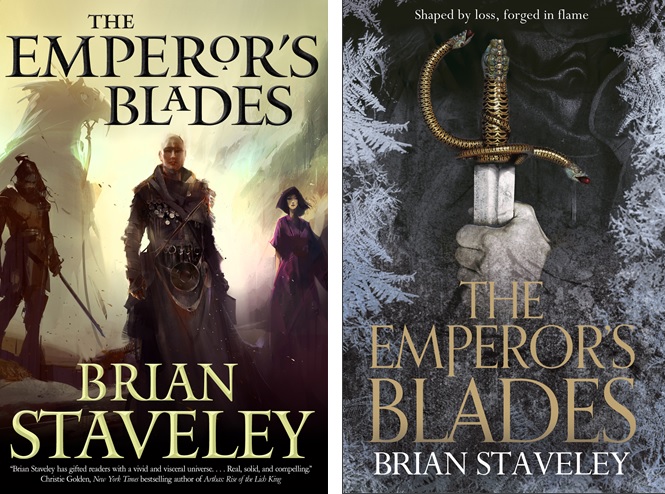With The Emperor’s Blades now out in paperback in both the US and the UK, we wanted to check in with author Brian Staveley. We wanted to find out how it feels to have two books out (even if they are the HB and PB of the same book) and interrogate him about his Machiavellian mind! Here is what he said…
Six months on from your first novel being published in hardback, are you used to being a published author? How does it feel to know the book is now establishing itself out in the world?
The best part about it all is when people get in touch with me on twitter or email to say they’ve enjoyed the book. It’s a little gift in my inbox every few days that just never gets old. Even better are the folks who contact me to say, “I just loved the book, but I have a question…” There was, for example, the surgeon who dropped a line saying he thought I was off in my description of one of the wounds, or the veterinarian who offered her services if I ever needed to dig deeper into the anatomy of the Kettral. It’s really wonderful knowing there are all these people out there reading the book, that at least for a few days it’s woven in some small way into their lives.
The Emperor’s Blades is a story featuring an empire in turmoil, where betrayal, intrigue and politics will dictate the future of a world. Have you been influenced by the lessons of real historical events or particular books—or do you just have a Machiavellian mind?!
I taught history for about a decade—ancient world, Mediterranean, and medieval European—and many, many of the scenes or situations in The Emperor’s Blades have their roots in real history. There are certain types of conflict that are immortal, that you see everywhere you have large imperial states: conflict between secular and religious powers (witness the Buddhist purges of the 9th century, or Diocletian’s persecution of Roman Christians); strife born from questions of succession; conflict between colliding races (the arrival of the Arya in the Indian subcontinent, for instance); never-ending cycles of oppression and rebellion; the specter of slavery in all its abominable forms… The list goes on, and furnishes a fantasy writer with plenty of raw materials.
What was the hardest thing you had to do, when working on the edits of The Emperor’s Blades?
The tenth draft. Or the twelfth. Or whatever it was. I’ve written in other places about cutting massive amounts of material, but that sort of hack-and-slash editing isn’t too tough for me. I can slice away fifty thousand words without really shedding a tear. Grinding through the manuscript one last time, however—and there seem to be a dozen “one last times”—is just brutal. Brutal but necessary. A good book is the product of tens of thousands of small decisions, and if I can get even two or three of these right each time I go through the text, it’s worth making another another pass. Imagine if George R.R. Martin had ended Game of Thrones with a draft where the Stark motto was: Summer’s Almost Over.
Do you have any advice for writers penning their second books? The first book can often take years to write, but the challenges of writing a book two are somewhat different.
I’m finished with The Providence of Fire—it’s coming out in January, actually—so the trials and tribulations of second books are fresh in my mind. I think the trickiest task is to give that second book its own identity, to make sure it’s not just a ligature between the beginning and the end. If Book II is just people running all over so they’re in the right place for the start of Book III, something’s not working. A good way to gauge this is to keep an eye on how much the characters change over the course of that second volume; they should come out of it very different people than they went in. If this isn’t the case, you could probably just skip the whole thing with an ellipsis.
There’s not a huge amount of magic in your books, relative to some fantasy books. But it can be oh so useful. If you could use magic to help you with one particularly onerous everyday task, what would it be?
I would have a small gargoyle perched on my shoulder. She would sit there quite quietly most of the time—eating flies, staring at the shadows, whatever it is gargoyles do. However, whenever I started following a plot thread in my novel that wasn’t going to work out, whenever I embarked on the writing of what would turn out to be half a dozen wasted chapters, she would turn on me, peck at my scalp with her beak, and scream, “Stupid! Stupid! Stupid!” into my ear.
The Emperor’s Blades is available now in paperback in the US and UK from Tor Books, following hardback/ebook publication. You can read the first seven chapters for free here on Tor.com! Its sequel, The Providence of Fire, publishes January 15th. Check out the cover design for the UK edition plus Richard Anderson’s cover art for the US edition, then join in on Staveley’s scavenger hunt to unlock an excerpt from the novel, “The Last Abbot of Ashk’lan.”
This article originally appeared on the Tor UK blog.
Bella Pagan is a senior commissioning editor, working on out-of-this world SF, fantasy and urban fantasy (plus other subdivisions, factions and associated areas) for Tor UK. On twitter as @BellaPagan.










